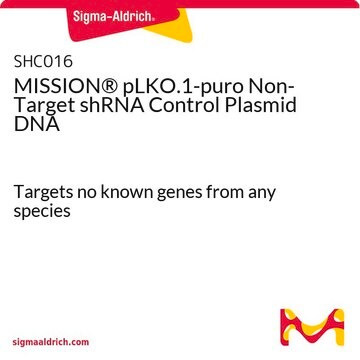SHC003V
MISSION® pLKO.1-puro-CMV-TurboGFP™ Positive Control Transduction Particles
Green fluorescent protein marker to monitor transduction efficiency
Synonyme(s) :
MISSION®, MISSION® TurboGFP™ Control Transduction Particles
About This Item
Produits recommandés
Niveau de qualité
100
200
Gamme de produits
MISSION®
Concentration
≥1x106 VP/ml (via p24 assay)
Technique(s)
capture ELISA: 106 TU/mL using p24
Conditions d'expédition
dry ice
Température de stockage
−70°C
Vous recherchez des produits similaires ? Visite Guide de comparaison des produits
Catégories apparentées
Description générale
TurboGFP™ is an improved variant of the green fluorescent protein copGFP cloned from the copepoda Pontellina plumata. The TurboGFP™ transduction particles are produced from the sequence-verified lentiviral plasmid, pLKO.1-puro-CMV-TurboGFP™ (SHC003). It is a positive control to monitor transduction efficiency.
Self-inactivating replication incompetent viral particles are produced in packaging cells (HEK293T) by co-transfection with compatible packaging plasmids. In addition, the Control Transduction Particles are pseudotyped with an envelope G glycoprotein from Vesicular Stomatitis Virus (VSV-G), allowing transduction of a wide variety of mammalian cells. 200 μl of 106 TU/ml (via p24 titering assay) lentiviral particles are provided as frozen stock.
To see more application data, protocols, vector maps visit sigma.com/shrna.
Application
Informations légales
En option
Code de la classe de stockage
12 - Non Combustible Liquids
Classe de danger pour l'eau (WGK)
WGK 3
Point d'éclair (°F)
Not applicable
Point d'éclair (°C)
Not applicable
Équipement de protection individuelle
Eyeshields, Gloves, multi-purpose combination respirator cartridge (US)
Certificats d'analyse (COA)
Recherchez un Certificats d'analyse (COA) en saisissant le numéro de lot du produit. Les numéros de lot figurent sur l'étiquette du produit après les mots "Lot" ou "Batch".
Déjà en possession de ce produit ?
Retrouvez la documentation relative aux produits que vous avez récemment achetés dans la Bibliothèque de documents.
Les clients ont également consulté
Notre équipe de scientifiques dispose d'une expérience dans tous les secteurs de la recherche, notamment en sciences de la vie, science des matériaux, synthèse chimique, chromatographie, analyse et dans de nombreux autres domaines..
Contacter notre Service technique








